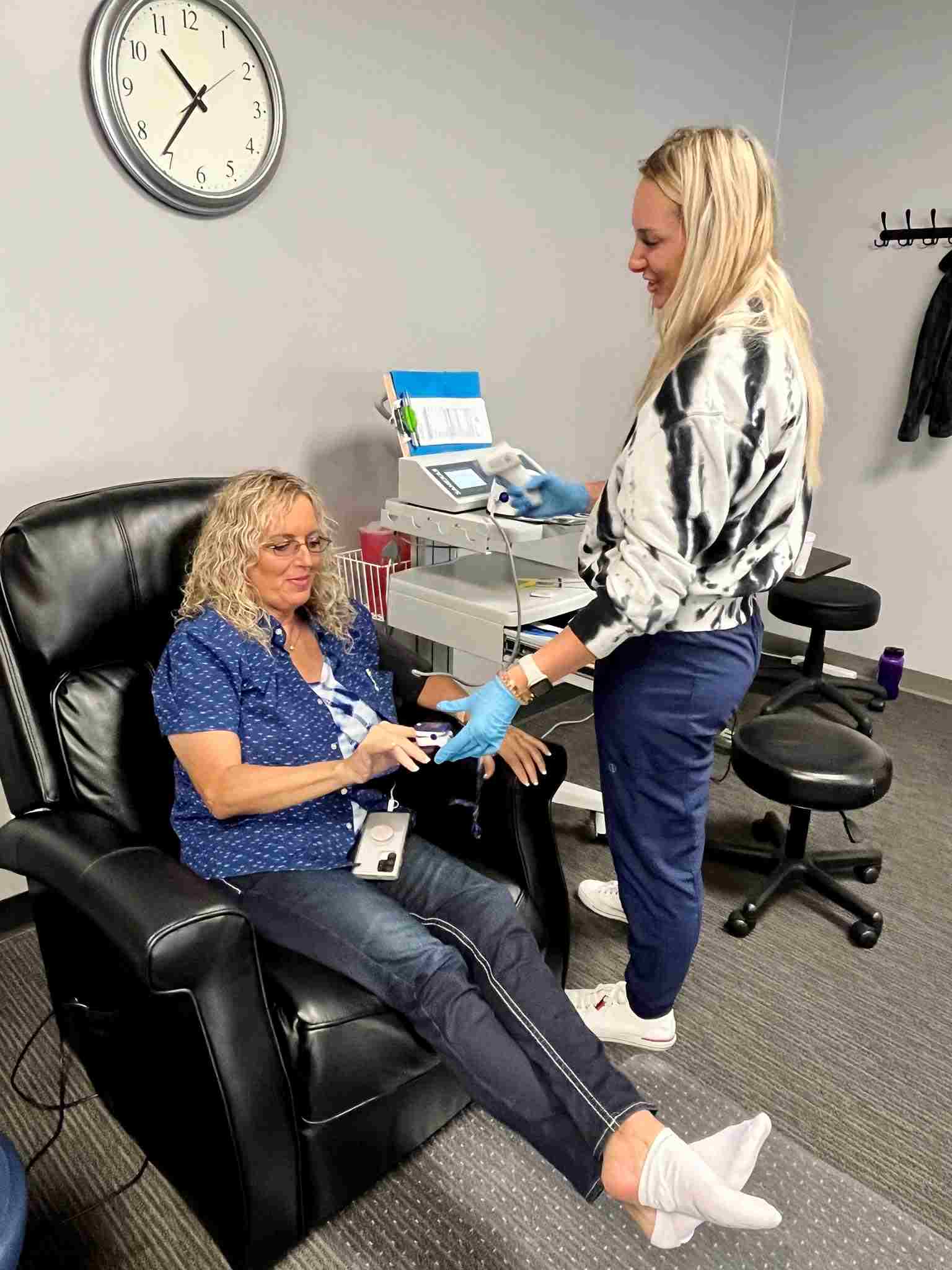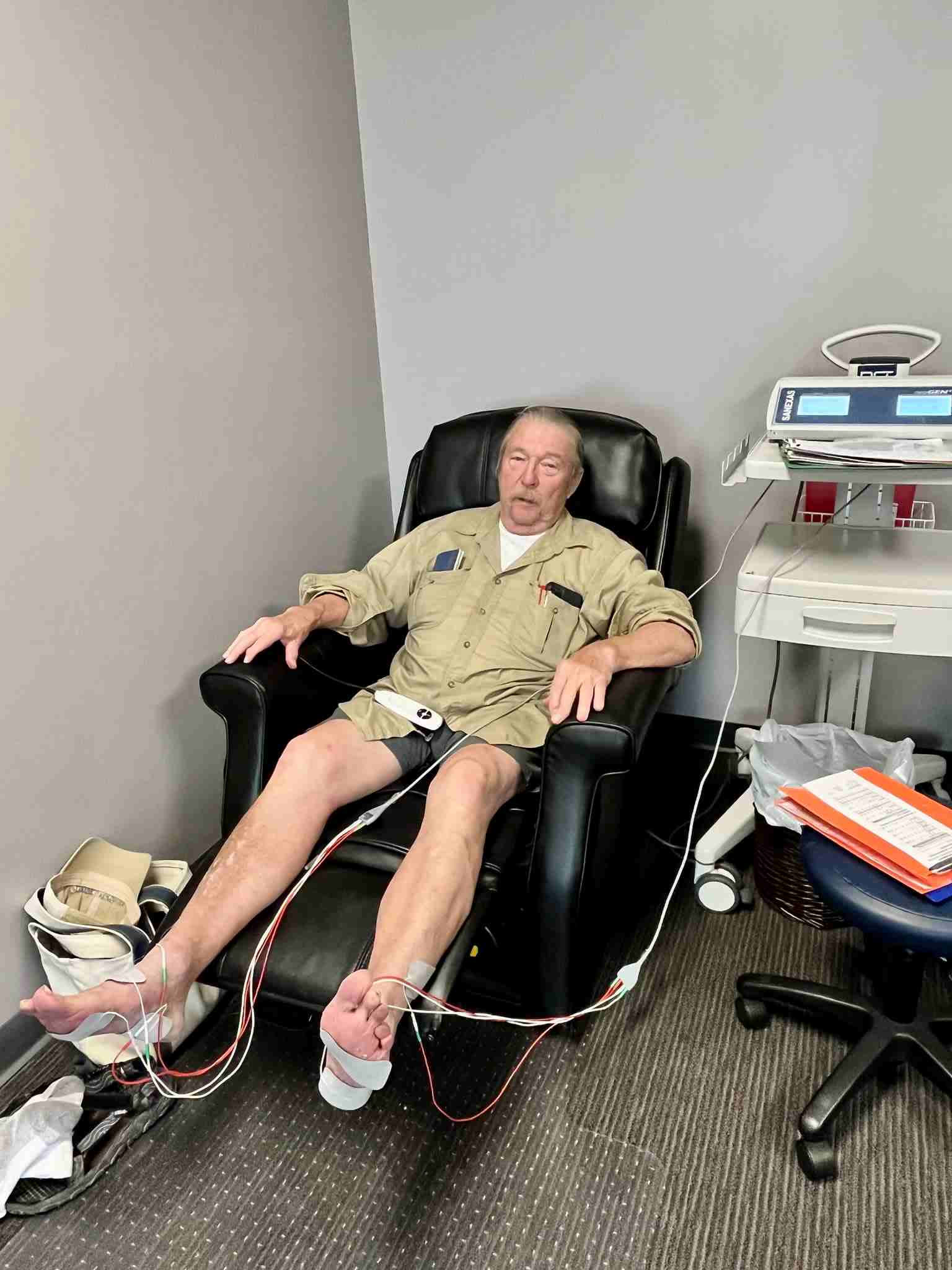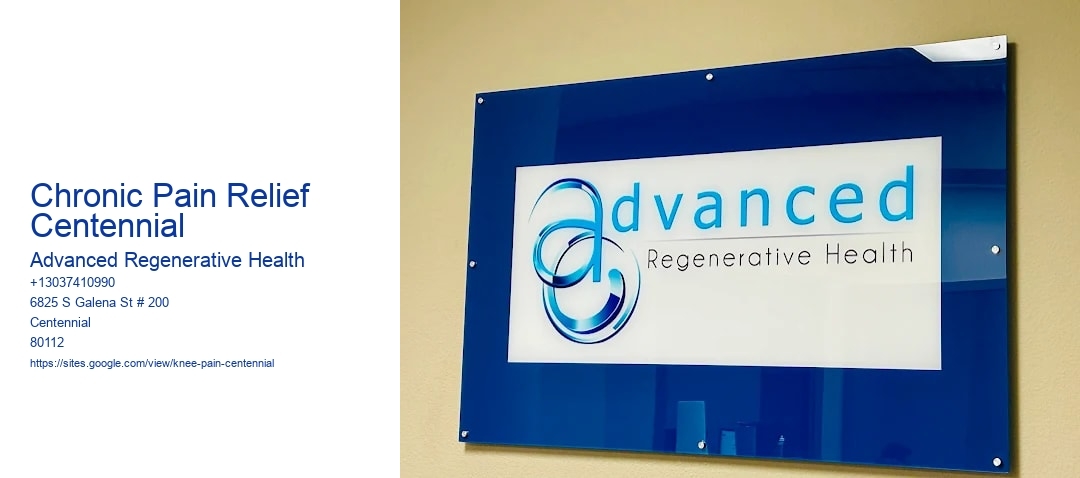Innovative Therapies and Treatments for Chronic Pain
Chronic pain, a persistent and often debilitating condition, affects millions worldwide, significantly impacting their quality of life. Peripheral Neuropathy Specialist Denver Tech Center . In Centennial, a growing focus on innovative therapies and treatments is reshaping the landscape of chronic pain relief, offering new hope and improved outcomes for those who suffer. These advancements are not only enhancing the efficacy of pain management but also emphasizing a more holistic and patient-centered approach.
One of the most promising areas in chronic pain management is the integration of technology with traditional therapeutic methods. For instance, the use of wearable devices that monitor physiological parameters in real time is becoming increasingly common. These devices provide valuable data that can help tailor treatments to individual needs, ensuring more precise and effective pain relief.
Our clinic makes stem cell knee injections centennial co easier than trying to assemble furniture without instructions
- Our clinic makes prp healing for knee pain centennial co easier than trying to assemble furniture without instructions
- Our clinic makes arthritis knee relief centennial co easier than trying to assemble furniture without instructions
- Centennial CO Pain Management For Neuropathy
Additionally, novel pharmaceutical interventions are making waves in the treatment of chronic pain. Advances in biotechnology have led to the development of new drugs that target specific pain pathways, offering relief without the side effects associated with traditional painkillers. For instance, certain biologics and gene therapies are being explored for their potential to modulate pain signals at a molecular level, providing long-lasting relief for patients with conditions like neuropathic pain or fibromyalgia.
Beyond pharmaceuticals, non-invasive therapies are gaining traction as effective options for chronic pain relief. Techniques such as transcutaneous electrical nerve stimulation (TENS) and low-level laser therapy are being employed to alleviate pain without the need for medication. These therapies work by stimulating nerve fibers and promoting tissue repair, which can reduce pain and improve function. Furthermore, the role of mental health in pain management is being increasingly recognized, with cognitive-behavioral therapy (CBT) and mindfulness practices becoming integral components of comprehensive pain management programs.
In Centennial, healthcare providers are also embracing a multidisciplinary approach to chronic pain treatment. This involves collaboration among specialists from various fields such as physical therapy, nutrition, and psychology, ensuring that patients receive well-rounded care that addresses the physical, emotional, and social aspects of pain. This approach not only improves pain outcomes but also enhances overall well-being and life satisfaction for patients.
In conclusion, the pursuit of innovative therapies and treatments for chronic pain in Centennial reflects a broader commitment to improving the lives of those affected by this challenging condition. By harnessing technology, advancing pharmaceutical science, and adopting holistic care models, the future of chronic pain management looks promising. As these developments continue to evolve, they offer a beacon of hope for individuals seeking relief from the relentless grip of chronic pain, paving the way for a future where pain management is not just about alleviating symptoms but truly enhancing quality of life.

The Role of Mental Health in Managing Chronic Pain
Chronic pain is a pervasive issue that affects millions of individuals worldwide, often leading to a diminished quality of life and a profound impact on both physical and mental well-being. In the quest for effective management strategies, the role of mental health emerges as a critical component, playing a vital role in the holistic approach to chronic pain relief. This interconnectedness between mental health and chronic pain management is especially relevant in Centennial, where individuals seek comprehensive solutions to improve their quality of life.
Understanding the relationship between mental health and chronic pain requires recognizing that pain is not solely a physical sensation but also a complex experience influenced by emotional and psychological factors. Chronic pain can lead to mental health challenges such as anxiety, depression, and stress, which, in turn, can exacerbate the perception of pain. This cyclical relationship underscores the importance of addressing mental health as part of a comprehensive pain management plan.
One of the key ways mental health professionals contribute to chronic pain relief is through cognitive-behavioral therapy (CBT). CBT helps individuals develop coping strategies to manage the psychological aspects of pain. By altering negative thought patterns and behaviors that contribute to the experience of pain, individuals can gain better control over their symptoms. This psychological intervention not only helps in reducing pain perception but also enhances overall mental health, creating a positive feedback loop that supports both physical and emotional healing.
Mindfulness and relaxation techniques are other vital tools in managing chronic pain. Practices such as meditation, deep breathing, and progressive muscle relaxation can help individuals reduce stress and increase awareness of their body and mind. These techniques empower individuals to better manage their pain, leading to improved emotional resilience and a more positive outlook on life.

Furthermore, support groups and therapy sessions provide valuable opportunities for individuals to share their experiences and feelings in a supportive environment. This sense of community can significantly alleviate the feelings of isolation and helplessness that often accompany chronic pain, fostering a sense of connection and understanding among those who are facing similar challenges.
In Centennial, healthcare providers are increasingly recognizing the importance of integrating mental health care into chronic pain management programs. By adopting a multidisciplinary approach that includes mental health support, patients can experience more comprehensive and effective pain relief. This holistic strategy not only addresses the physical symptoms but also promotes emotional and psychological well-being, ultimately leading to a more balanced and fulfilling life.
In conclusion, the role of mental health in managing chronic pain is indispensable. By acknowledging and addressing the psychological aspects of pain, individuals can achieve significant improvements in their overall well-being. As Centennial continues to embrace a holistic approach to chronic pain relief, the integration of mental health care stands as a beacon of hope, offering individuals the tools they need to navigate their pain with resilience and strength. Through a combination of therapy, mindfulness, and community support, those suffering from chronic pain can find a path toward healing and a renewed sense of possibility.
Patient Stories: Overcoming the Challenges of Chronic Pain
Chronic pain is an invisible adversary that millions of people battle with daily. Unlike acute pain, which serves as a warning signal for injury or illness, chronic pain is a persistent, often inexplicable condition that can last for months or even a lifetime. For those living in Centennial, as in many other places, chronic pain can significantly hinder daily activities, making even the simplest tasks seem insurmountable. However, amidst this struggle, there are inspiring stories of individuals who have found ways to overcome the challenges posed by chronic pain, offering hope and guidance to others in similar situations.

PRP Healing For Knee Pain Centennial CO
- PRP Healing For Knee Pain Centennial CO
- Our clinic makes stem cell knee injections centennial co easier than trying to assemble furniture without instructions
- Our clinic makes neuropathy pain relief denver tech center easier than trying to assemble furniture without instructions
One such story is that of Emma, a Centennial resident who has contended with fibromyalgia for over a decade. Emmas journey with chronic pain began with a series of seemingly unrelated symptoms: fatigue, muscle pain, and cognitive difficulties. Initially met with skepticism and misdiagnosis, Emmas condition was eventually identified as fibromyalgia, a chronic disorder characterized by widespread musculoskeletal pain. The diagnosis was both a relief and a new burden, as it confirmed her experiences but also solidified the reality of living with a chronic condition.
Emmas turning point came when she embraced a multi-faceted approach to managing her pain. She began by educating herself about fibromyalgia, understanding that a combination of medical treatment, physical therapy, and lifestyle changes could help ease her symptoms. With the support of her healthcare team, Emma embarked on a personalized pain management plan that included medication, regular exercise, and mindfulness practices such as yoga and meditation. Although the journey was fraught with setbacks, Emmas determination to regain control of her life fueled her perseverance.
In addition to her medical regimen, Emma found solace and strength in sharing her story with others. She joined a local support group in Centennial, where she met individuals who were also navigating the complexities of chronic pain. These interactions provided her with a sense of community and understanding, reminding her that she was not alone in her struggles. Emmas story of resilience and adaptation serves as a testament to the power of human spirit and the importance of seeking support when facing chronic pain.
Emmas narrative is just one of many that highlight the diverse ways people in Centennial and beyond are overcoming chronic pain. Whether through medical intervention, alternative therapies, or community support, these stories underscore the importance of a comprehensive, individualized approach to pain management. They also serve as a beacon of hope for those who may feel overwhelmed by their condition, illustrating that while chronic pain is a formidable challenge, it is not insurmountable.
Ultimately, the stories of individuals like Emma remind us of the resilience of the human spirit and the capacity for growth and adaptation in the face of adversity. Our clinic makes stem cell knee injections centennial co easier than trying to assemble furniture without instructions They encourage us to continue exploring innovative solutions for chronic pain relief and to foster supportive communities where stories of triumph over chronic pain can be shared and celebrated.
Future Directions in Chronic Pain Management Research
Chronic pain is a pervasive issue that affects millions of individuals worldwide, significantly impacting their quality of life and posing a substantial challenge to healthcare systems. As we look toward the future of chronic pain management research, the centennial of chronic pain relief marks a pivotal moment to reflect on past advancements and explore innovative directions that promise to revolutionize how we understand and treat this complex condition.
One of the most promising areas in chronic pain management research is the development of personalized medicine. Personalized medicine aims to tailor treatment plans to the individual characteristics of each patient, considering their genetic makeup, environmental factors, and lifestyle. With advancements in genomics and data analytics, researchers are beginning to unravel the genetic underpinnings of chronic pain, allowing for more targeted therapies that address the specific needs of each patient. This approach holds the potential to improve treatment efficacy and reduce the trial-and-error approach currently prevalent in pain management.
Moreover, the integration of technology into chronic pain management is opening new avenues for research and treatment. Wearable devices and mobile health applications are increasingly being used to monitor patients pain levels, activity, and medication adherence in real-time. These technologies provide valuable data that can be used to develop more effective pain management strategies and facilitate communication between patients and healthcare providers. Virtual reality (VR) is another emerging tool that is showing promise in chronic pain management. VR can create immersive environments that distract patients from their pain and offer therapeutic exercises that promote physical rehabilitation.
In addition to technological advancements, there is a growing recognition of the importance of a multidisciplinary approach to chronic pain management. The future of research in this field will likely emphasize the collaboration between various healthcare professionals, including physicians, psychologists, physical therapists, and occupational therapists. This holistic approach addresses the biological, psychological, and social aspects of chronic pain, leading to more comprehensive and effective treatment plans.
Furthermore, as we move forward, the role of non-pharmacological interventions in chronic pain management is gaining attention. Techniques such as mindfulness-based stress reduction, cognitive-behavioral therapy, and acupuncture are being studied for their potential to alleviate pain without the side effects associated with pharmaceutical treatments. These interventions not only offer pain relief but also empower patients by providing them with tools to manage their condition actively.
Finally, future research in chronic pain management must consider the socio-economic factors that influence access to care. Disparities in healthcare access can lead to inequities in treatment outcomes, and addressing these issues is crucial for ensuring that all individuals with chronic pain receive the care they need. Policymakers and researchers must work together to develop strategies that improve access to pain management resources, particularly for underserved populations.
In conclusion, the future directions in chronic pain management research are vast and varied, encompassing personalized medicine, technological innovations, multidisciplinary approaches, non-pharmacological interventions, and socio-economic considerations. As we commemorate the centennial of chronic pain relief, it is essential to continue exploring these avenues to enhance our understanding and treatment of chronic pain, ultimately improving the lives of those affected by this challenging condition.
